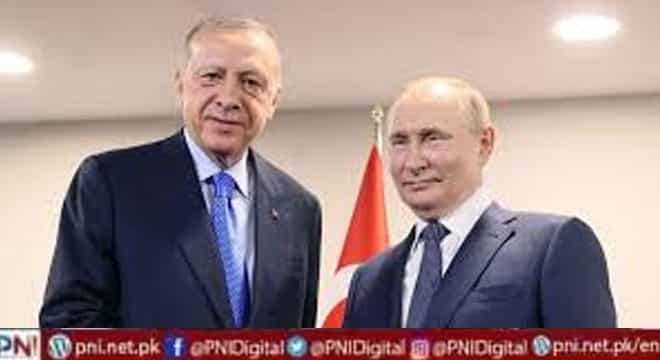Samarkand, Uzbekistan, Nov 11 (AFP/APP):Turkish President Recep Tayyip Erdogan on Friday called on post-Soviet countries in resource-rich Central Asia to ramp up ties with Ankara as he sought to take advantage of a weakening Moscow bogged down in Ukraine.
“We are going through a fragile period that poses risks as well as opportunities to our countries,” Erdogan told a meeting of the Organisation of Turkic States (OTS) summit in Uzbekistan’s ancient city of Samarkand.
“We see that it is critical more than ever for us to strengthen the cooperation, solidarity and harmony among us during this period,” the Turkish leader said during his third trip to the region in two months.
Analysts say Ankara is determined to gain a foothold in a region that the Kremlin has traditionally considered its sphere of influence as Moscow is mired in the protracted war in Ukraine.
Erdogan has for years been pushing for closer cultural, linguistic and religious ties with ex-Soviet countries in the Caucasus and Central Asia.
Russia’s invasion of Ukraine on February 24 spooked Moscow’s neighbours in Central Asia and spurred Kazakhstan — the region’s largest country — and Uzbekistan, the most populous, to look for alliances elsewhere: both with China and Europe.
The OTS group includes Azerbaijan — a former Soviet republic with a Turkic language located in the Caucasus region bordering Turkey — as well as Kazakhstan, Kyrgyzstan and Uzbekistan in Central Asia.
Turkmenistan, also in Central Asia, and EU member state Hungary are observer members of the group.
Turkey’s Foreign Minister Mevlut Cavusoglu said on Friday that the self-proclaimed Turkish Republic of Northern Cyprus, which is not recognised by the international community, would join the group as an observer, but there was no immediate comment from the OTS.
The group last year dropped its former name, the Turkic Council, in favour of the Organisation of Turkic States.
Speaking on Friday, Erdogan called for the establishment “as soon as possible” of the Turkic Investment Fund to “give momentum to our activities.”
– Veiled criticism –
Speaking at the summit, Kazakh President Kassym-Jomart Tokayev appeared to reiterate his country’s opposition to Moscow’s landgrab of Ukrainian territory saying Kazakhstan “decisively support the territorial integrity of all states.”
Kyrgyzstan President Sadyr Japarov for his part insisted on the need to “cooperate even more closely” to ramp up trade and find new supply chains.
“This community of Turkic states is beginning to take shape,” Bayram Balci, who teaches political science at France’s Sciences Po, told AFP.
Turkey’s efforts to build political alliances with Turkic ex-Soviet states after the 1991 breakup of the USSR were long hampered by the influence of Russia.
“Since the beginning of this dream of creating a Turkic community, the weight and influence of Russia have been obstacles,” Balci said.
But the Karabakh war between Armenia and Azerbaijan in 2020, followed by Russia’s invasion of Ukraine, have given new impetus to Turkey’s quest for influence in the region.
– ‘Interests not incompatible’ –
But Turkey and Russia, which cooperate despite disagreements in several geopolitical arenas, could find common ground to work together in Central Asia.
“The interests of Turkey and Russia in Central Asia are not fundamentally incompatible,” said Andrei Grozin, a Central Asia analyst at Moscow’s Institute of CIS Countries.
Turkey is also deepening military ties with former Soviet states, in particular with the sale of drones.
The International Trade Center (ITC), a Geneva-based agency attached to the World Trade Organisation and the United Nations, says that the volume of Turkish-Central Asian trade in 2019 amounted to some $7.3 billion.
That figure falls far behind Central Asia’s volume of trade with the European Union and Russia, which the ITC says amounted that year to around $29 billion, and China ($25 billion).
Follow the PNI Facebook page for the latest news and updates.









